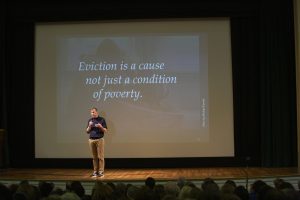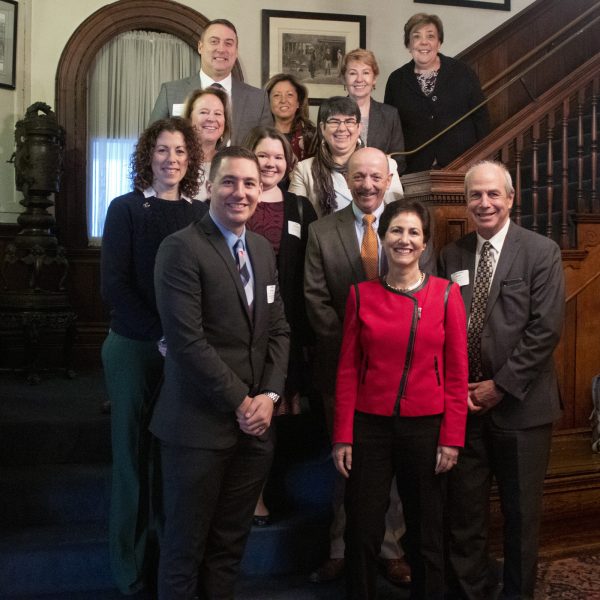
Early in 2019, the Community Foundation formed a community partnership with Catholic Charities, Unity House, and the New York State Writers Institute called Changing the Conversation. Our goals are to educate and raise awareness around relevant community issues and inspire changemakers to take action. On November 14, 2019, the committee brought Matthew Desmond, Pulitzer-Prize Winning Author of Evicted: Poverty and Profit in the American City to Albany for a presentation about the epidemic facing our community. The stories, statistics, and possible solutions shared at the event will help us identify ways we can change the conversation around safe and affordable housing in the Capital Region.

Our Committee wanted to share a few of the points we took from the event:
- Eviction is a cause not just a condition of poverty. In the Capital Region, 1 in 2 renters are cost burdened. This means they are at risk of facing eviction. Several factors lead to eviction including the rising cost of housing, lack of transportation, personal crisis, emergency expenses, health factors, lack of support, poor housing options and limited income. Once evicted, families could fall into poverty, or deeper into crisis.
- Families, especially children, are impacted the most. The majority of evictions are single mothers — and children are caught in the middle. Women, unfortunately, experience wage disparities, harassment, domestic violence, and other issues making it harder to support their families. Some landlords will not risk renting to families. When evictions happen, children suffer incredible losses and fall behind in school.
- There is not enough housing assistance for those who need it. 74% of those who qualify for federal housing assistance cannot get the support they need and it could take years waiting to be considered for housing support. Families remain in the private market — a market they cannot afford and with no support.
- Racial inequality and disparities exist and must be addressed. 1 in 5 black women have been evicted compared to 1 in 15 white women. People of color are at greater risk of eviction and poverty, and they receive less of the resources available. Desmond said, “If incarceration had come to define the lives of men from impoverished black neighborhoods, eviction was shaping the lives of women. Poor black men were locked up. Poor black women were locked out.”
- The U.S. is one of the richest nations and yet has some of the worst poverty issues. In 2008, the U.S. gave out over $171 billion in homeowner tax benefits, exceeding the budgets of the Departments of Education, Veteran Affairs, Homeland Security, Justice, and Agriculture combined. In 2018, 38.1 million people lived in Poverty, where a couple was making an average annual salary of $16,247.
- Universal Housing Vouchers could help pay for safe housing. A universal housing voucher program would carve a middle path between the landlord’s desire to make a living and the tenant’s desire to have safe, affordable housing.
- Eviction takes a traumatic toll on people. Studies also show that eviction causes job loss, as the stressful and drawn-out process of being forcibly expelled from a home causes people to make mistakes at work and lose their job. Eviction also has been shown to affect people’s mental health. One study found that mothers who experienced eviction reported higher rates of depression two years after their move.
- The Eviction Lab and Just Shelter are two resources to gather data and identify resources in the Capital Region. The Eviction Lab at Princeton University has built the first nationwide database on evictions. Just Shelter was founded by Matthew Desmond and Tessa Lowinske Desmond to raise awareness of the human cost of the lack of affordable housing in America. They amplify the work of community organizations working to preserve affordable housing, prevent eviction, and reduce family homelessness. Our event page also has information and resources specific to the Capital Region.

